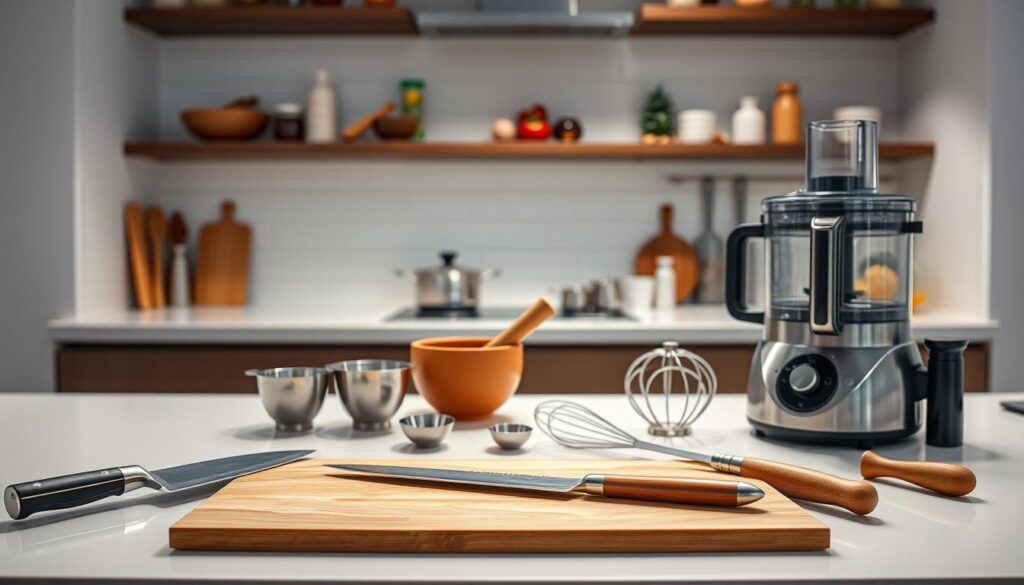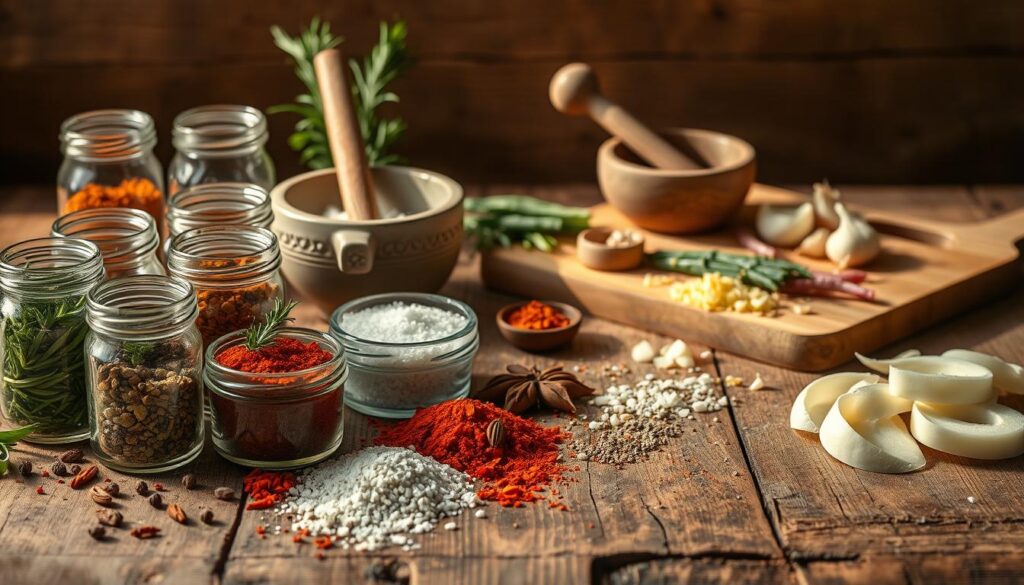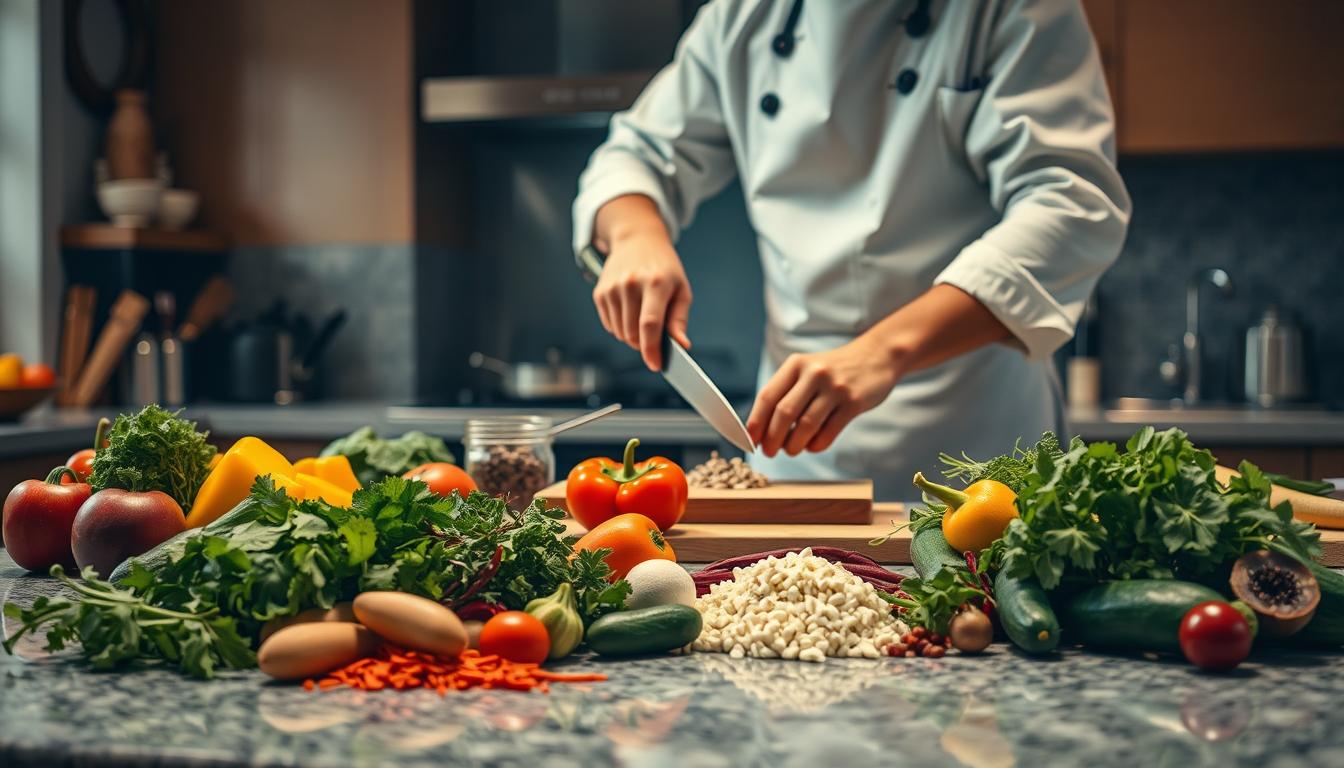Enhance Your Culinary Skills for Cooking Mastery
Are you ready to turn your kitchen into a professional cooking space? Mastering culinary skills is more than just following recipes. It’s about understanding the art and science of making amazing dishes.
The food service industry needs you to keep learning and improving. Enhancing your culinary skills is not a luxury but a must for anyone who loves cooking. Professional chefs know that staying still means falling behind in the fast-changing world of food.
Cooking is not just about making food; it’s about showing creativity, precision, and passion. Whether you cook at home or dream of being a pro, improving your culinary skills can lead to great opportunities and personal joy.
Key Takeaways : Cooking Mastery
- Continuous learning is crucial in culinary arts
- Mastering cooking techniques increases confidence
- Professional skills lead to better career opportunities
- Creativity and technique go hand in hand
- Practice and experimentation drive culinary excellence
The Importance of Culinary Skills Enhancement
Learning to cook is more than just making food. It’s a journey that opens doors to new opportunities. With professional chef training, you can create amazing dishes with skill and confidence.
Why Cooking Skills Matter
Culinary skills are key to success in the kitchen. They include a wide range of techniques. These ensure your food is not only delicious but also prepared with care and creativity.
- Mastering diverse cooking methods
- Understanding food safety practices
- Developing kitchen management expertise
- Creating innovative menu designs
The Benefits of Improving Your Culinary Skills
Getting professional chef training has many benefits. It not only improves your job chances but also boosts your creativity in the kitchen.
| Skill Category | Career Impact |
|---|---|
| Cooking Techniques | Expanded job opportunities |
| Food Safety Knowledge | Increased workplace credibility |
| Kitchen Management | Advanced career progression |
Keeping up with learning is critical in cooking. Those who keep improving their skills stay ahead in the fast-changing culinary world.
The art of cooking is a journey of constant discovery and improvement.
Assessing Your Current Cooking Abilities
Knowing your cooking level is key to getting better. A detailed self-check helps spot your strong points and areas to work on. This is important for your cooking journey.
Experts say it’s smart to check your cooking skills carefully. By looking at what you can do now, you can plan how to get better. You might even want to get a culinary arts certification.
Self-Evaluation Techniques
- Document your current cooking repertoire
- Rate your comfort level with different cooking techniques
- Assess your knife skills and precision
- Test your understanding of flavor combinations
- Evaluate your ability to follow and modify recipes
Identifying Strengths and Weaknesses
A survey gives us clues on how to get better at cooking. It shows that different ages have different cooking skills:
- Child learners showed highest confidence in cooking skills
- Teen learners demonstrated superior food skill scores
- Adult learners exhibited more consistent fiber intake
To get better at cooking, focus on specific skills. Look into advanced cooking workshops or online classes. They can help fill knowledge gaps and make you more confident in the kitchen.
Continuous learning and practice are key to mastering culinary arts.
Essential Cooking Techniques to Master
Learning strong cooking techniques is key to becoming a great chef. Culinary schools teach the basics that turn beginners into pros. Knowing these techniques lets you cook better and with more confidence.
Professional chefs see cooking as more than just recipes. It’s about how heat, ingredients, and methods come together to make amazing dishes.
Knife Skills: The Cornerstone of Culinary Preparation
Knife skills are vital for quick and efficient cooking. Learning the right ways to use knives can save time and make food look better. Important knife skills include:
- Choosing the right knife for each job
- Keeping knives sharp for safety
- Mastering cuts like julienne and dice
- Knowing how to hold the knife
“A sharp knife is a chef’s best friend in the kitchen.” – Professional Chef Wisdom
Sautéing and Stir-frying: Quick Cooking Techniques
Sautéing and stir-frying are great for fast, tasty meals. Sautéing cooks food quickly in a bit of fat over high heat. Stir-frying is similar but often used in Asian cooking.
Baking Fundamentals: Precision and Science
Baking needs precision and a grasp of chemistry. Important points include:
- Measuring ingredients accurately
- Knowing about leavening agents
- Controlling oven temperatures
- Proper mixing methods
By focusing on these key techniques, future chefs can lay a solid foundation. Remember, practice and patience are essential to get better at these basics.
Building Your Kitchen Toolbox
Developing culinary skills takes more than just passion. You need the right tools. A well-equipped kitchen turns cooking into an exciting adventure. Professional chefs know that quality tools are key to making great dishes.

Must-Have Kitchen Tools for Aspiring Chefs
Every culinary workshop stresses the need for essential tools. Here are the must-haves for every home cook:
- Chef’s knife for precise cutting
- Digital kitchen scale for accurate measurements
- Instant Pot to reduce cooking time by up to 70%
- Immersion blender for safe liquid processing
- Mandoline slicer for uniform vegetable cuts
- Digital meat thermometer for perfect cooking temperatures
Choosing the Right Cookware
Choosing the right cookware is crucial for your culinary skills. Consider these factors when buying kitchen equipment:
- Material durability
- Heat conductivity
- Cooking style compatibility
- Long-term investment potential
Professional chefs recommend investing in high-quality tools that will last and enhance your cooking experience.
By choosing the right kitchen tools, you’ll create a workspace that supports your culinary creativity and skill growth.
Understanding Different Cooking Styles
Exploring the rich world of cooking styles is key for improving your culinary skills. From old techniques to new ones, knowing various cooking methods can make you a gourmet expert.
Cooking techniques have changed a lot over thousands of years. Each method has its own way to prepare and enhance food flavors. The wide range of cooking styles shows off cultural traditions and new ideas in cooking.
Classic Cooking Techniques
Traditional cooking methods are the base of culinary knowledge. Important classic techniques include:
- Braising: A mix of dry and moist heat
- Roasting: Uses dry heat to bring out rich flavors
- Poaching: Cooks gently in liquid at a set temperature
- Simmering: Cooks just below boiling point for tender food
Modern Culinary Trends
Today’s cooking is all about new and exciting ways to cook. Trends in gourmet cuisine include:
- Molecular gastronomy: Uses science in cooking
- Sous vide: Cooks at precise temperatures
- Fusion cuisine: Mixes different culinary traditions
- Fermentation techniques
Knowing both classic and modern cooking styles is crucial. It lets chefs make amazing dishes that show off their skills. The secret is understanding how different techniques change ingredients and create unique flavors.
Flavor Profiles and Seasoning Essentials
Learning about flavor profiles is key for chefs. It’s more than just cooking. It’s about understanding seasoning and taste balance.

Seasoning turns simple ingredients into amazing dishes. Chefs learn to add depth by knowing the five tastes: salty, sweet, sour, bitter, and umami.
The Art of Seasoning
Salt is the most important seasoning in any kitchen. Different salts can really bring out flavors:
- Sea salt
- Kosher salt
- Flavored salts
Balancing Flavors in Dishes
Getting flavors to work together is a skill. Chefs use special techniques to make dishes unforgettable.
| Flavor Category | Key Ingredients | Culinary Purpose |
|---|---|---|
| Sweet | Honey, Maple Syrup | Balance and Enhance |
| Spicy | Chili Powder, Cayenne | Add Heat and Depth |
| Umami | Soy Sauce, Mushrooms | Create Richness |
“Seasoning is the language of flavor, and every chef must become fluent.” – Culinary Wisdom
Having a good taste is essential for chefs. Training teaches them to taste, adjust, and mix seasonings for perfect dishes.
By mastering flavors, chefs can make simple ingredients into amazing dishes. These dishes will amaze and delight everyone who tries them.
Learning from Culinary Experts
Learning more about cooking is not just about basic steps. Working with culinary experts gives you deep insights into cooking’s art and science. Programs and workshops help you grow professionally and turn your passion into a career.
Famous Chefs to Follow for Inspiration
Learning from famous chefs can really boost your cooking skills. Here are some top chefs to check out:
- Gordon Ramsay – Known for intense kitchen techniques and precision
- Alton Brown – Brings scientific approach to cooking methods
- Dominique Crenn – Innovative approach to modern gastronomy
- José Andrés – Pioneers culinary innovation and social impact
*”The more you know, the more you realize how much you don’t know.”* – Julia Child
Online Cooking Courses and Resources
Today, technology has changed how we learn to cook. Many online platforms offer workshops that are just as good as classroom learning. Sites like MasterClass, Udemy, and Coursera let you learn from top chefs.
| Platform | Unique Features | Skill Level |
|---|---|---|
| MasterClass | Celebrity Chef Instruction | All Levels |
| Udemy | Diverse Course Selection | Beginner to Advanced |
| Coursera | Academic-Backed Programs | Professional Development |
Did you know that about 70% of successful chefs say learning is key to moving up? With online tools and expert advice, you can learn advanced cooking skills from home.
Practicing Culinary Skills Regularly
Improving your cooking skills takes regular practice and dedication. By cooking often, you become more confident and skilled in the kitchen. This is because you build muscle memory and learn new techniques.
To get better, you need a plan for learning and practicing. Students who cook a lot show big improvements in many areas.
Creating a Weekly Cooking Schedule
Creating a weekly cooking plan is key. It helps you stay focused and committed. Here are some tips:
- Choose 3-4 days a week for cooking
- Try different recipes to learn new techniques
- Set aside specific times for cooking
- Keep track of your progress
Experimenting with New Recipes
Trying new recipes is a great way to improve your cooking. It helps you become more confident and expands your cooking skills.
| Cooking Frequency | GPA Impact | Stress Level | Time Management |
|---|---|---|---|
| Daily | 3.8 | 4.2 | 8.7 |
| 3-4 times/week | 3.6 | 5.1 | 7.9 |
| 1-2 times/week | 3.3 | 6.3 | 6.8 |
| Rarely/Never | 3.0 | 7.5 | 5.6 |
Research shows that cooking often helps you do better in school and manage stress better. By cooking regularly, you’ll improve your cooking skills and your life in general.
Joining Culinary Communities
Connecting with others who love food can really help you grow in your chef training. Food lovers do best when they work together, sharing ideas and learning from each other.
Culinary communities are great for learning new skills and making professional contacts. They offer many resources for chefs who want to get better at cooking.
Exploring Local Cooking Classes
Local cooking classes are a fantastic way to learn by doing. You get to meet other food lovers and learn from experienced chefs. These classes can help you get better at cooking and meet new people.
- Direct interaction with experienced instructors
- Practical technique demonstrations
- Immediate feedback on cooking methods
- Networking with local culinary enthusiasts
“Cooking is about passion, and learning from others who share that passion can transform your culinary journey.” – Professional Chef Instructor
Engaging in Online Forums
Online platforms have changed the way chefs learn, creating global communities. Online forums and social media groups let chefs:
- Share cooking techniques
- Discuss ingredient innovations
- Receive international culinary insights
- Connect with industry professionals worldwide
The Jacques Pépin Foundation shows how important learning together is. They offer free group memberships and educational resources for chefs who want to keep improving.
Embrace the power of culinary communities to accelerate your gastronomic skills and professional growth.
Setting Goals for Culinary Advancement
To improve your cooking skills, setting goals is key. Dr. Gail Matthews found that writing down goals boosts success chances. The SMART goals method helps by focusing on specific, measurable, achievable, relevant, and timely goals.
Improving your cooking skills means setting both short and long-term goals. You might want to learn new techniques or explore special cooking areas like plant-based dishes. The E-E-E Model shows that setting goals can make you more confident and help you grow in your cooking career.
Dr. Edwin Locke’s study shows that the act of cooking itself can be more exciting than the final dish. You can aim to start a food truck business in 60 days or explore different career paths. Always keep learning and being open to new things in the ever-changing world of cooking.
It’s important to track your progress in cooking. Go to workshops, join cooking classes, and get feedback from top chefs. By setting clear goals and working hard, you can turn your love for cooking into a valuable skill that opens many doors in your career.
FAQ
How long does it take to enhance my culinary skills?
Improving your cooking skills takes time and effort. You can see big changes in 6-12 months with regular practice. Professional chef programs last from 6 months to 2 years, depending on your goals.
Do I need formal culinary arts certification to improve my cooking skills?
You don’t need a formal certification to get better at cooking. But, culinary arts programs offer structured learning and expert advice. Home cooks can also learn a lot from online courses and workshops.
What are the most important basic cooking techniques to learn?
You should learn knife skills, sautéing, roasting, baking, and how to balance flavors. Mastering these basics is key to making more complex dishes.
How can I assess my current culinary skill level?
To check your skills, evaluate your cooking techniques and flavor knowledge. Try recording your cooking and get feedback from others. Compare your skills to professionals through workshops or online resources.
What kitchen tools are essential for skill development?
You’ll need a good chef’s knife, cutting board, pots, pans, measuring tools, thermometer, blender, and food processor. Quality tools make cooking easier and more fun.
How important are online cooking courses in skill enhancement?
Online courses are very helpful for learning new skills. They offer flexibility, expert instruction, and a wide range of cuisines. You can learn at your own pace with video tutorials and interactive lessons.
How often should I practice cooking to improve my skills?
Practice cooking often, aiming for 3-4 times a week. Focus on different techniques and cuisines. This helps build muscle memory and confidence.
What are the benefits of joining culinary communities?
Joining culinary communities offers many benefits. You can network, learn from others, get feedback, and stay inspired. They provide a space to share ideas and discover new techniques.
Can I enhance my culinary skills as a home cook?
Yes, home cooks can improve their skills a lot. With practice, online resources, and a willingness to learn, you can grow a lot. Passion and curiosity are key.
How do I set realistic culinary skill development goals?
Use the SMART goal approach. Make your goals Specific, Measurable, Achievable, Relevant, and Time-bound. Regularly check and adjust your goals to stay motivated.

